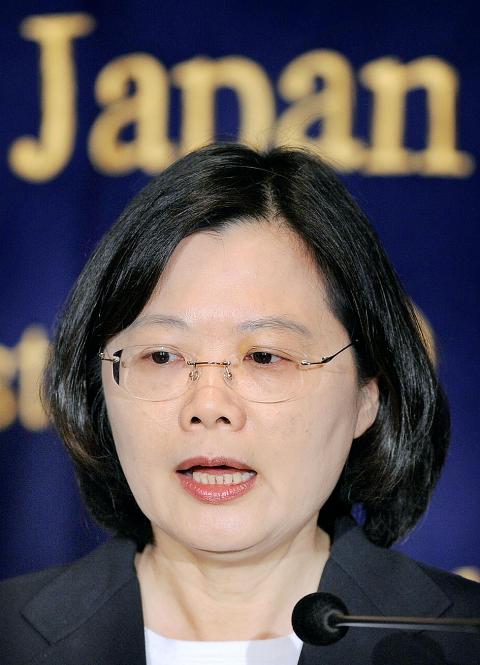|
Tsai lauds bilateral
relations in Tokyo
BEST OF FRIENDS: The DPP chairperson emphasized
four elements in the nation’s ‘special relationship’ with Japan: security,
democracy, economy, and trade and travel
By Chris Wang / Staff Reporter

Democratic Progressive Party
Chairperson Tsai Ing-wen makes a speech during a press conference at the Foreign
Correspondents Club in Tokyo yestserday.
Photo: AFP
Democratic Progressive Party (DPP)
Chairperson Tsai Ing-wen (蔡英文) yesterday highlighted the US-Japan security pact
as the cornerstone of stability in East Asia and the DPP’s wish to strengthen
Taiwan’s relations with Japan in a speech in Tokyo.
Japan “continues to occupy a special place in the emotions of the Taiwanese
people,” the DPP’s presidential candidate told the Foreign Correspondents Club
of Japan.
Tsai, who is in the middle of a three-day visit to Japan, emphasized four
elements in Taiwan’s relationship with Japan: security, democracy, economy, and
trade and travel, as well as other areas of interaction.
While Taiwan is not a formal partner in the Japan-US Security Alliance, Tsai
said she believes it is important to “involve all parties, to communicate and
dialogue, to manage territorial disputes in a peaceful and rational way, to
ensure the freedom of navigation and to enhance transparency in military
modernization” in the “cornerstone of peace and stability in East Asia.”
Closer economic ties with Japan would also help to prevent further
marginalization and over-dependence on China economically, Tsai said, adding
that it would be mutually beneficial if Taiwan were to join the APEC-based
free-trade agreement or the Trans-Pacific Partnership (TPP).
She said that Taiwan and Japan share similar social and political challenges,
such as the dominance of social and economic issues as key domestic themes and
anti-nuclear awareness following the accident at the Fukushima Dai-ichi Nuclear
Power Plant in March.
She went on to detail her initiative of a “Taiwan consensus” — the starting
point of her policy on China — highlighting it as an inclusive, democratic
process.
Future Taiwan-China engagement should be based on a “new foundation” which is
inclusive, she said,
Ultimately the DPP wants to ensure that “the right to determine Taiwan’s future
rests in the hands of the people of Taiwan, and any change to the status quo
must be agreed by the people of Taiwan through democratic means,” she said.
Any precondition for dialogue that is not transparent and not in line with the
democratic consensus of Taiwanese would not be sufficient to deal with the
complexities of the cross-strait relationship, Tsai said.
The DPP is not naive about the differences across the Strait, she said, but
cross-strait engagement would not be a zero-sum game “as long as both sides are
sincere about building a peaceful and stable framework for interaction.”
Tsai said her victory in the January presidential election over President Ma
Ying-jeou (馬英九) would be “a demonstration of the progressiveness and openness of
Taiwan’s society.”
In a speech to overseas Taiwanese on Monday, Tsai described the affinity and
solid relations between Taiwanese and Japanese over the years as being a form of
“Taiwan consensus.”
The DPP’s two main policies are that a “Taiwan consensus” is needed for Taiwan
to develop its external relations, in particular relations with China, while
domestically, social harmony and consolidation should be in place before the
implementation of economic reforms, she said.
In response to a question from a Japanese student about a “Taiwan identity,”
Tsai said that it is important to have a balanced education system so that
people can be proud of being Taiwanese.
Being Taiwanese or Chinese is an option; it does not depend on ethnicity, social
status or one’s educational background, she said, adding: “If people are proud
of being Taiwanese, then they have Taiwanese identity in mind.”
Tsai said all territorial disputes between Taiwan and Japan should be resolved
peacefully, since it would be very difficult to imagine that both sides would
resort to force.
As an experienced negotiator, Tsai said, she proposes that both sides first
negotiate on common interests, such as fishing rights and maritime development,
and set the territorial disputes aside until later.
|
![]()
![]()
![]()